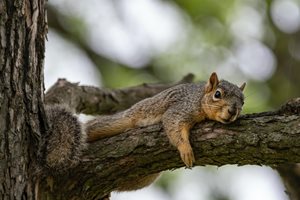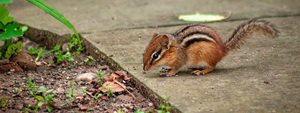How to Identify Squirrels & Chipmunks
They are two of the most common yard pests in North America. Squirrels and chipmunks are so ubiquitous in our surroundings that we sometimes hardly notice them anymore. Both squirrels and chipmunks are rodents of the same Sciuridae family but belong to different species. While squirrels and chipmunks share similarities, they are also surprisingly different.
The most obvious difference between squirrels and chipmunks is their size. Squirrels, particularly tree squirrels, can grow to be 16 to 20 inches long and weigh about one and a half pounds. Chipmunks are less than half the size of a squirrel and weigh only about four ounces.
Chipmunks also have black, brown, or white stripes running along the sides of their faces and backs, and their tails are shorter and have less fur. Squirrels are mostly brownish-gray with full, fluffy tails.
Need Help with Squirrel infestation?
Find a Critter Control near you.
Squirrel vs Chipmunk Habitat and Behavior Differences
Squirrels and chipmunks have quite different habitats and behaviors, even though they both appear to be running around foraging and hiding nuts all day long. Whether living in urban or rural areas, squirrels are predominantly tree dwellers, while chipmunks burrow under the ground.


Squirrel Nests vs Chipmunk Holes
Squirrel nests are called dreys, and they’re built high up in the forks of tree branches. Constructed out of twigs, leaves, grasses, and other natural debris, these dreys can vary in size to accommodate all their offspring. Chipmunks dig burrows and create an extensive network of tunnels that contain several chambers and entrances. One chamber is used for nesting and is lined with leaves and grass for comfort and warmth. Other chambers are used for storing food.
Squirrel vs Chipmunk Diet
Both squirrels and chipmunks are foragers of nuts and seeds, which they hoard to keep them fed through the winter months. While squirrels have many caches, chipmunks use one of their burrow chambers. Technically, squirrels are considered herbivores, but chipmunks are omnivores whose diet can include fruit, insects, and eggs. While squirrels carry their nuts in their mouth, chipmunks have cheeks within their mouth to carry food back to their burrow.
Squirrel vs Chipmunk Noises
Like most animals, both squirrels and chipmunks use vocalizations to establish territory, avoid predators, and attract a mate.
Biologist Thaddeus McRae describes the sounds squirrels make as kuks, quaas, and moans. Kuks sound like a small dog barking, while quaas sound like the meow of a cat. Both are used to ward off predators and warn other nearby squirrels. They will also make a sort of cooing sound while communicating with their pups.
Chipmunk vocalizations are defined mostly as chipping, trills, croaks, and chirps. The croaks and chirps are used as mating calls. Chipping and trills are for communicating danger.
Reproduction
Both squirrels and chipmunks need safe places to give birth. It is one of the most common reasons these animals because a nuisance — building a nest and giving birth inside your home.
Squirrels have two mating seasons — in late winter or early spring and again in late summer. Chipmunk mate once per year in late winter/early spring. While chipmunks are monogamous in that the partners stay together throughout the season, squirrels live a more promiscuous lifestyle where both males and females have multiple partners.
Squirrel courtship activities include much chasing, scent marking, and vocalizations. Chipmunks also participate in chasing, vocalizations, and scent marking. And they groom one another.
Squirrels give birth to anywhere from two to six young after a gestation period of about four to six weeks. Chipmunks have a shorter gestation period of about 31 to 32 days. They give birth to four to five young. The females of both species take care of the young until they are mature enough to go off on their own, although male chipmunks will protect the burrows and gather food for the females and pups.
Squirrel Damage vs Chipmunk Damage
Squirrels, as agile tree climbers, can easily take advantage of a weakness in a home’s roof, eaves, and soffits to gnaw their way into an attic. They do not hibernate, so the warm air that is escaping through even a tiny gap tells them your attic would make a great winter den. As rodents, squirrel teeth continue to grow throughout their lives. Once inside your attic, they will tear insulation and gnaw on wood, cardboard cartons, and wires. This gnawing will cause costly damage to your home, and chewed wires could be a fire hazard. In addition, they will bring in nuts and acorns and defecate, creating a mess.
Chipmunks create a very different kind of damage. They have no interest in coming inside a home. Instead, they will dig their tunnels under walkways, driveways, and your foundation. This can cause damage to your foundation as well as upheaval or cracks in driveways and walkways. Chipmunks are also small enough to get through fencing to invade flower beds and vegetable gardens, where they will eat bulbs and other edibles.
Signs of Infestations
If you have squirrels in your attic, the signs include hearing noises and scampering in your attic during the daytime. Squirrels are diurnal and will be most active at dusk and dawn. There can also be droppings in the house that look similar to bat guano but larger. You will also notice a foul smell coming from their nesting area from the accumulation of feces and urine.
The most obvious sign of a chipmunk infestation is seeing lots of chipmunks running around your property. They like to create burrows near houses, porches, and under decks, so look for small holes in the ground surrounded by loose dirt. If you can also recognize seed and nut shells near these holes, it’s a sure sign of chipmunks. They will also grab bulbs from underground and take bites from fruit and vegetables.
Learn more about squirrel removal.
Get them out.
Keep them out.®
Experiencing a wildlife or pest issue? We can help! Complete this form and your local Critter Control® office will contact you to assist.
- How to Get Rid of Squirrels
- Squirrels Entering Homes
- Squirrels in Attics
- Squirrels in Chimneys
- Squirrels on Roofs & in Soffits
- Squirrels in Walls
- Squirrels in Ventilation
- Squirrels in Gutters
- Squirrels in Crawl Spaces
- Squirrels in Yards or Gardens
- Squirrels in Trees
- Squirrels Digging Holes in the Ground
- How to Identify Squirrel Sounds
- Squirrel Tracks
- Squirrel Droppings
- Squirrel Trapping
- Squirrel Repellents & Deterrents
- Squirrel Appearance & Identification
- Species & Types of Squirrels
- Squirrel Life Cycle
- Baby Squirrels
- Squirrel Nest
- Dead Squirrels
- Squirrel Diet
- Diseases That Squirrels Carry
- Rabid Squirrels
- Do Squirrels Hibernate?
- Gray Squirrels
- Do Squirrels Bite?
- Squirrel Damage to Your House
- Squirrels vs. Rats